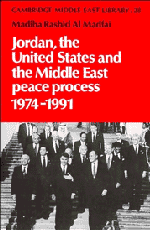Book contents
- Frontmatter
- Contents
- Foreword by William B. Quandt
- Acknowledgements
- Prologue
- 1 Introduction
- 2 Kissinger's legacy and imprint on the Middle East
- Part I Jordan in the Carter Middle East policy
- Part II Jordan in the Reagan Middle East policy
- Part III US, Jordan and Arab approaches to peace
- Appendices
- Notes
- Select bibliography
- Index
- Cambridge Middle East Library
1 - Introduction
Published online by Cambridge University Press: 25 February 2010
- Frontmatter
- Contents
- Foreword by William B. Quandt
- Acknowledgements
- Prologue
- 1 Introduction
- 2 Kissinger's legacy and imprint on the Middle East
- Part I Jordan in the Carter Middle East policy
- Part II Jordan in the Reagan Middle East policy
- Part III US, Jordan and Arab approaches to peace
- Appendices
- Notes
- Select bibliography
- Index
- Cambridge Middle East Library
Summary
The independent Sovereign state of Jordan: some historical considerations
After the First World War Palestine passed from the Ottoman yoke straight into Britain's sphere of influence. So it remained, until 29 September 1922 when the Mandate, allocated to Britain by resolution of the League of Nations on 16 September, was confirmed by the Council of the League. Two Articles of the Mandate are relevant to this study.
Article 2 specified that the national home of the Jewish People was to be established in Palestine and that the Mandatory was under obligation to safeguard the civil and religious rights of all the inhabitants of Palestine irrespective of race or religion. To the Jews this meant their right of return to ‘Eretz Israel’ or ‘Biblical Israel’, after their dispersal by the Romans in 135 AD. To the Arabs – Christians and Moslems – it meant an alien intrusion into what they regarded as their homeland for the past thirteen centuries. As divine promises have no standing in international law, the Jews' biblical rights were regarded by the Arabs as a fanciful ‘allegation’ to further political ends.
Article 25 of the Mandate stressed that ‘In the territories lying between the Jordan and the eastern boundary of Palestine, as ultimately determined, the Mandatory shall be entitled with the consent of the League of Nations to postpone or withhold applications of such provisions of this Mandate as he may consider suitable to those conditions, provided that no action shall be taken which is inconsistent with the provisions of Articles 15, 16 and 18 [relating to religious freedom and the open door economy]’.
- Type
- Chapter
- Information
- Publisher: Cambridge University PressPrint publication year: 1993

